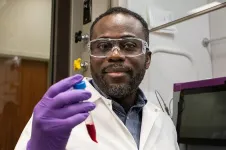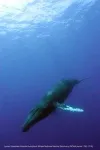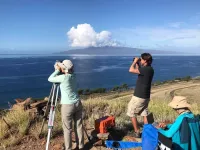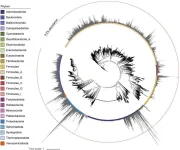(Press-News.org) WEST LAFAYETTE, Ind. – Four researchers in Purdue University’s colleges of Engineering and Science, the Purdue Institute for Cancer Research and the Purdue Institute for Drug Discovery have received a total of $150,000 from the Trask Innovation Fund to strengthen the appeal of their patent-pending intellectual property for commercial use.
The fund is managed by the Purdue Innovates Incubator, which provides programming for the Purdue University community to ideate, refine and support their solutions. The fund awards up to $50,000 for short-term projects that enhance the commercial value of Purdue intellectual property.
The application deadline for the next round of funding is Feb. 16. Questions about applications can be submitted to trask@prf.org.
The fall 2023 Trask Innovation Fund recipients, their projects and award amounts are:
Mohammad Reza Jahanshahi, College of Engineering, “Autonomous Crack Assessment Software,” $25,000.
Jahanshahi, an associate professor in the Lyles School of Civil Engineering, has developed a patent-pending, advanced computer vision system to autonomously detect defects in pipelines, especially in the oil and gas industry.
“The primary goal of this system is to enhance pipeline safety by providing accurate detection of structural defects and anomalies,” Jahanshahi said. “Additionally, it aims to reduce operational costs and environmental risks by minimizing the need for manual inspections and enabling more efficient maintenance strategies.”
Jahanshahi said the system marks a significant leap in ensuring pipeline integrity and safety.
“Our innovative system utilizes cutting-edge, machine learning algorithms and deep learning techniques to analyze X-ray images with unprecedented accuracy and speed,” Jahanshahi said. “By leveraging sophisticated image-processing methods, the system can identify even the most subtle anomalies and defects that are often undetectable by traditional inspection methods.”
Jahanshahi said integration of the technology into regular maintenance protocols allows for monitoring and early detection of potential issues, drastically reducing the risk of leaks, ruptures and environmental hazards. He said its autonomous nature minimizes the need for human intervention, increasing efficiency and reducing operational costs.
“This system not only promises to revolutionize the way pipeline integrity is managed in the oil and gas sector but also sets a new standard for safety and environmental responsibility in the industry,” Jahanshahi said. “The Trask funding allows us to enhance the algorithm to detect defects in X-ray images of pipelines through a rigorous training and testing process where thousands of X-ray images will be utilized to this end.”
Panagiota Karava, College of Engineering, “MySmartE – An Eco-feedback and Gaming Platform for Home Energy Management,” $25,000.
Karava, a professor in the Lyles School of Civil Engineering, leads a multidisciplinary research team from the College of Engineering, College of Liberal Arts, Mitchell E. Daniels, Jr. School of Business and Purdue Polytechnic Institute that created patent-pending MySmartE, an eco-feedback and gaming system for residential energy management.
“MySmartE addresses the need to effectively deploy energy-efficiency and decarbonization programs in residential communities that would result in measurable, transferable and sustainable outcomes,” Karava said. “This is accomplished by actively engaging and incentivizing residents in understanding and reducing their home energy use.”
MySmartE achieved more than 80% residential engagement and 30% energy-use reduction when deployed in more than 130 households across the Indiana cities of Indianapolis, Fort Wayne, South Bend and New Albany.
Karava said the scope of the Trask-funded project will be to expand the MySmartE user map to include a management portal with dashboard features.
“The team is already engaging with partners, and the end goal of the project is for MySmartE to become a complete product ready for commercialization,” Karava said.
Hyowon Lee, College of Engineering, “Development of Thrombectomy Retraction Aspiration Platform (TRAP),” $50,000.
Stroke is the second-leading cause of death around the globe; it kills about 140,000 Americans annually. Almost 90% of stroke cases are caused by an obstruction of one of the arteries that supplies blood to the brain. Swiftly reestablishing blood flow is imperative to preserve neurological function. The current gold standard to remove an obstruction is a catheter with a self-expanding stent that acts like a rake. This method has a high risk of damaging thinner arterial walls.
Lee, an associate professor in the Weldon School of Biomedical Engineering and director of Center for Implantable Devices, has worked with postdoctoral researcher Ángel EnrÍquez and clinical partners at Goodman Campbell Brain and Spine and NYU Langone Health to develop a patent-pending, novel clot-retrieving platform called Thrombectomy Retraction Aspiration Platform, or TRAP.
“The TRAP catheter integrates biomimetic design into the aspiration catheter tip to enhance forces to remove the obstruction and prioritizes safety,” Lee said. “The design demonstrated a greater than 200% increase in occlusion removal force compared to a traditional catheter. We believe our simple, nature-inspired approach to this problem will disrupt the field of stroke treatment.”
Lee, in partnership with a new startup, Emboa Medical, will use the Trask funding to establish a manufacturing process to integrate microscale structures into the distal tip of catheters. They will conduct in vitro experiments to quantitatively demonstrate the advantages of TRAP catheters in increasing the effectiveness of extracting blood clots.
“The successful completion of these aims planned in this project will lead to early prototypes that can facilitate the transition to larger-scale verification activities toward regulatory approval,” Lee said.
Herman Sintim, College of Science, Purdue Institute for Cancer Research and Purdue Institute for Drug Development, “New Agents for Potential Treatment of Arthritis,” $50,000.
According to the National Health Interview Survey, from 2019-21 more than 53 million Americans were diagnosed with some form of arthritis, fibromyalgia, gout, lupus or rheumatoid arthritis. This includes 26% of adults aged 45-64 and more than 47% of adults 65 or older.
Sintim, the Richard B. Wetherill Professor of Chemistry and Drug Discovery and Distinguished Professor in Chemistry in the Department of Chemistry, said protein kinases play various important roles in a cell. Protein kinases are enzymes that add phosphates to other proteins, which changes those proteins’ cellular location, enzyme activity or association with other proteins. He said kinases are potential targets for arthritis treatment.
“My colleagues and I have identified orally bioavailable compounds that inhibit key kinases that play crucial roles in the progression of inflammatory arthritis,” Sintim said. “The Trask funding will facilitate the evaluation of these compounds in reducing the severity of arthritis in an animal model of rheumatoid arthritis. Such animal studies are needed before a drug candidate can be evaluated in humans.”
Sintim’s compounds are patent-pending.
The impact of Trask funding: crossing the ‘valley of death’
Matt Dressler, Purdue Innovates Incubator’s fund manager, said the Trask Innovation Fund supports researchers between the time of innovation creation and marketplace adoption, known as the “valley of death.”
“It can take years for an innovative idea to advance far enough to garner industry attention. There are many challenges to overcome during this time, including technology obsolescence and an innovator feeling dispirited by a lack of progress,” Dressler said. “The Trask Innovation Fund can address these challenges by providing faculty with focused funds to translate a research discovery toward a viable product solution. It complements several other resources Purdue Innovates provides to university inventors and entrepreneurs.”
Abhijit Karve, the Purdue Innovates Office of Technology Commercialization’s director of business development, said Trask awards have been used several ways by recipients.
“Awardees have used the funding to support students, conduct tests, generate data and develop prototypes,” Karve said. “This additional level of validation of the research makes it more attractive to companies that want to license it and bring it to the marketplace.”
Between the 2013 and 2023 fiscal years, around $3 million in Trask funding has been awarded to 81 projects. Forty percent of the technologies that have received Trask funding have been licensed or optioned to industry.
These and other innovations created by Purdue researchers across all academic disciplines and campuses, are available for further development and licensing. Contact the Purdue Innovates Office of Technology Commercialization at otcip@prf.org for more information.
About Purdue Innovates Incubator
The Purdue Innovates Incubator is the front door to the rich ecosystem of programs and services designed to help early-stage startups take their next step. Programs provide settings for cohort work and one- on-one consultations with entrepreneurs-in-residence. Content includes clarifying problems from the customer’s perspective, developing a business model, conducting customer discovery interviews, team building, determining regulatory pathways and legal structures, and more. Purdue alumni and community members interested in becoming mentors are invited to contact the Incubator team.
About Purdue University
Purdue University is a public research institution with excellence at scale. Ranked among top 10 public universities and with two colleges in the top four in the United States, Purdue discovers and disseminates knowledge with a quality and at a scale second to none. More than 105,000 students study at Purdue across modalities and locations, with 50,000 in person on the West Lafayette campus. Committed to affordability and accessibility, Purdue’s main campus has frozen tuition 13 years in a row. See how Purdue never stops in the persistent pursuit of the next giant leap, including its first comprehensive urban campus in Indianapolis, the new Mitchell E. Daniels, Jr. School of Business, and Purdue Computes, at https://www.purdue.edu/president/strategic-initiatives.
Writer/Media contact: Steve Martin, sgmartin@prf.org
Sources: Matt Dressler, mrdressler@prf.org
Abhi Karve, aakarve@prf.org
END
Purdue Innovates awards Purdue researchers $150K to develop innovations for the marketplace
Funded projects focus on blood clot removal, home energy management, pipeline safety and arthritis treatment
2024-01-24
ELSE PRESS RELEASES FROM THIS DATE:
JMIR Bioinformatics and Biotechnology invites submissions for research papers on machine learning-driven genomic predictive models
2024-01-24
JMIR Publications is pleased to announce a new theme issue titled “Machine Learning-Based Predictive Models Using Genomic Data” in JMIR Bioinformatics and Biotechnology. The peer-reviewed journal is indexed in SCOPUS and focused on research in bioinformatics, computational biology, and biotechnology. This new theme issue aims to explore cutting-edge research at the intersection of machine learning and genomics, fostering advancements in predictive modeling for biological insights.
JMIR Bioinformatics and Biotechnology welcomes contributions from global researchers, educators, and practitioners. We encourage submissions exploring diverse aspects of bioinformatics ...
Humpback whales move daytime singing offshore, research reveals
2024-01-24
Humpback whale singing dominates the marine soundscape during winter months off Maui. However, despite decades of research, many questions regarding humpback whale behavior and song remain unanswered. New research revealed a daily pattern wherein whales move their singing away from shore throughout the day and return to the nearshore in the evening. The findings were led by the University of Hawaiʻi, in partnership with NOAA’s Hawaiian Islands Humpback Whale National Marine Sanctuary, and published in Royal Society Open Science.
“Singers may be attempting to reduce the chances of their song being drowned ...
New oviraptor dinosaur from the US Hell Creek Formation lived at the end of the Age of Dinosaurs and weighed about the same as an average woman
2024-01-24
New oviraptor dinosaur from the US Hell Creek Formation lived at the end of the Age of Dinosaurs and weighed about the same as an average woman
###
Article URL: https://journals.plos.org/plosone/article?id=10.1371/journal.pone.0294901
Article Title: A new oviraptorosaur (Dinosauria: Theropoda) from the end-Maastrichtian Hell Creek Formation of North America
Author Countries: USA, Canada
Funding: Funding for histology processing provided to HNW by Oklahoma State University for Health Sciences. Funding to GFF provided by the Royal Society (Grant NIF\R1\191527) and a Banting Fellowship ...
Galápagos penguin is exposed to and may accumulate microplastics at high rate within its food web, modelling suggests
2024-01-24
Modelling shows how microplastics may bioaccumulate in the Galápagos Islands food web, with Galápagos penguins most affected, according to a study published January 24, 2024 in the open-access journal PLOS ONE by Karly McMullen from the University of British Columbia, Canada, under the supervision of Dr. Juan José Alava and Dr. Evgeny A. Pakhomov of the Institute for the Ocean and Fisheries, University of British Columbia, Canada, and colleagues.
We know that microplastics are building up in our oceans, but the extent of the damage to marine organisms is still being assessed. Here, McMullen and colleagues focused ...
Obesity spiked in children during COVID-19 lockdowns—only the youngest bounced back
2024-01-24
Obesity among primary school children in the UK spiked during the COVID-19 lockdown, with a 45% increase between 2019/20 and 2020/21 among 4-5-year-olds, according to a study published on January 24, 2024 in the open-access journal PLOS ONE by Iván Ochoa-Moreno from the University of Southampton, UK, and colleagues. The authors estimated that without reversals, increased obesity rates in Year 6 children alone will cost society an additional £800 million in healthcare.
During the first year of the pandemic, school closures dramatically altered the routines of young children. Cancellation of organized sports, ...
Risk of death during heatwaves in Brazil linked to socioeconomic factors
2024-01-24
A new study suggests that heatwaves are exacerbating socioeconomic inequalities in Brazil, with people who are female, elderly, Black, Brown, or who have lower educational levels potentially facing greater risk of death during heatwaves. Djacinto Monteiro dos Santos of Universidade Federal do Rio de Janeiro, Brazil, and colleagues present these findings in the open-access journal PLOS ONE on January 24, 2024.
As climate change progresses, heatwaves are becoming hotter, longer, and more frequent in many regions ...
DNA from preserved feces reveals ancient Japanese gut environment
2024-01-24
DNA from ancient feces can offer archaeologists new clues about the life and health of Japanese people who lived thousands of years ago, according to a study published January 24, 2024 in the open-access journal PLOS ONE by Luca Nishimura and Ituro Inoue from the National Institute of Genetics, Japan, Hiroki Oota from The University of Tokyo, Mayumi Ajimoto from Wakasa History Museum, and colleagues.
Fossilized feces, also known as coprolites, can preserve an array of genetic material from the digestive tracts ...
A virus that infected the first animals hundreds of millions of years ago has become essential for the development of the embryo
2024-01-24
At least 8% of the human genome is genetic material from viruses. It was considered ‘junk DNA’ until recently, but its role in human development is now known to be essential
Researchers at the Spanish National Cancer Research Centre (CNIO) describe for the first time the role of these viruses in a key process in development, when cells become pluripotent few hours after fertilization
The finding, published in Science Advances, is relevant for regenerative medicine and for the creation of artificial ...
City of Hope, TGen researchers develop machine-learning tool to detect cancer earlier via liquid biopsy
2024-01-24
LOS ANGELES — Researchers at City of Hope, one of the largest cancer research and treatment organizations in the United States, and Translational Genomics Research Institute (TGen), a precision medicine research organization that is part of City of Hope, have developed and tested an innovative machine-learning approach that could one day enable the earlier detection of cancer in patients by using smaller blood draws. The study was published today in the journal Science Translational Medicine.
“A huge body of evidence shows that cancer caught at later stages kills people. This new technology gets us closer to a world ...
Gene behind heart defects in Down syndrome identified
2024-01-24
Francis Crick Institute press release
Under strict embargo: 19:00hrs GMT 24 January 2024
Peer reviewed
Experimental study
Animals
Gene behind heart defects in Down syndrome identified
Researchers at the Francis Crick Institute and UCL have identified a gene that causes heart defects in Down syndrome, a condition that results from an additional copy of chromosome 21.
Reducing the overactivity of this gene partially reversed these defects in mice, setting the scene for potential future therapies for heart conditions in people with Down syndrome.
Down syndrome ...
LAST 30 PRESS RELEASES:
Brainwaves of mothers and children synchronize when playing together – even in an acquired language
A holiday to better recovery
Cal Poly’s fifth Climate Solutions Now conference to take place Feb. 23-27
Mask-wearing during COVID-19 linked to reduced air pollution–triggered heart attack risk in Japan
Achieving cross-coupling reactions of fatty amide reduction radicals via iridium-photorelay catalysis and other strategies
Shorter may be sweeter: Study finds 15-second health ads can curb junk food cravings
Family relationships identified in Stone Age graves on Gotland
Effectiveness of exercise to ease osteoarthritis symptoms likely minimal and transient
Cost of copper must rise double to meet basic copper needs
A gel for wounds that won’t heal
Iron, carbon, and the art of toxic cleanup
Organic soil amendments work together to help sandy soils hold water longer, study finds
Hidden carbon in mangrove soils may play a larger role in climate regulation than previously thought
Weight-loss wonder pills prompt scrutiny of key ingredient
Nonprofit leader Diane Dodge to receive 2026 Penn Nursing Renfield Foundation Award for Global Women’s Health
Maternal smoking during pregnancy may be linked to higher blood pressure in children, NIH study finds
New Lund model aims to shorten the path to life-saving cell and gene therapies
Researchers create ultra-stretchable, liquid-repellent materials via laser ablation
Combining AI with OCT shows potential for detecting lipid-rich plaques in coronary arteries
SeaCast revolutionizes Mediterranean Sea forecasting with AI-powered speed and accuracy
JMIR Publications’ JMIR Bioinformatics and Biotechnology invites submissions on Bridging Data, AI, and Innovation to Transform Health
Honey bees navigate more precisely than previously thought
Air pollution may directly contribute to Alzheimer’s disease
Study finds early imaging after pediatric UTIs may do more harm than good
UC San Diego Health joins national research for maternal-fetal care
New biomarker predicts chemotherapy response in triple-negative breast cancer
Treatment algorithms featured in Brain Trauma Foundation’s update of guidelines for care of patients with penetrating traumatic brain injury
Over 40% of musicians experience tinnitus; hearing loss and hyperacusis also significantly elevated
Artificial intelligence predicts colorectal cancer risk in ulcerative colitis patients
Mayo Clinic installs first magnetic nanoparticle hyperthermia system for cancer research in the US
[Press-News.org] Purdue Innovates awards Purdue researchers $150K to develop innovations for the marketplaceFunded projects focus on blood clot removal, home energy management, pipeline safety and arthritis treatment









